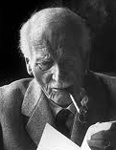 In Modern Man in Search of a Soul, C.G. Jung elucidates how understanding the shadow self leads to psychic health:
In Modern Man in Search of a Soul, C.G. Jung elucidates how understanding the shadow self leads to psychic health:
Not infrequently the soul is identified with the shadow, for which reason it is a deadly insult to tread upon a person’s shadow. For the same reason, noon-day, the ghost-hour of southern latitudes, is considered threatening; the shadow then grows small, and this means that life is endangered. This conception of the shadow contains an idea which was indicated by the Greeks in the word synopados, “he who follows behind.” They expressed in this way the feeling of an intangible, living presence—the same feeling which led to the belief that the souls of the departed were shadows.
These indications may serve to show how primitive man experienced the psyche. To him the psyche appears as the source of life, the prime mover, a ghost-like presence which has objective reality. Therefore the primitive knows how to converse with his soul; it becomes vocal within him because it is not he himself and his consciousness. To primitive man the psyche is not, as it is to us, the epitome of all that is subjective and subject to the will; on the contrary, it is something objective, contained in itself, and living its own life.
This way of looking at the matter is empirically justified, for not only on the primitive level, but with civilized man as well, psychic happenings have an objective side. In large measure they are withdrawn from our conscious control. We are unable, for example, to suppress many of our emotions; we cannot change a bad mood into a good one, and we cannot command our dreams to come or go. The most intelligent man may at times be obsessed with thoughts which he cannot drive away with the greatest effort of will. The mad tricks that memory plays sometimes leave us in helpless amazement, and at any time unexpected fantasies may run through our minds. We only believe that we are masters in our own house because we like to flatter ourselves. Actually, however, we are dependent to a startling degree upon the proper functioning of the unconscious psyche, and must trust that it does not fail us.
Excerpt from the Carl Jung ebook, Modern Man in Search of a Soul